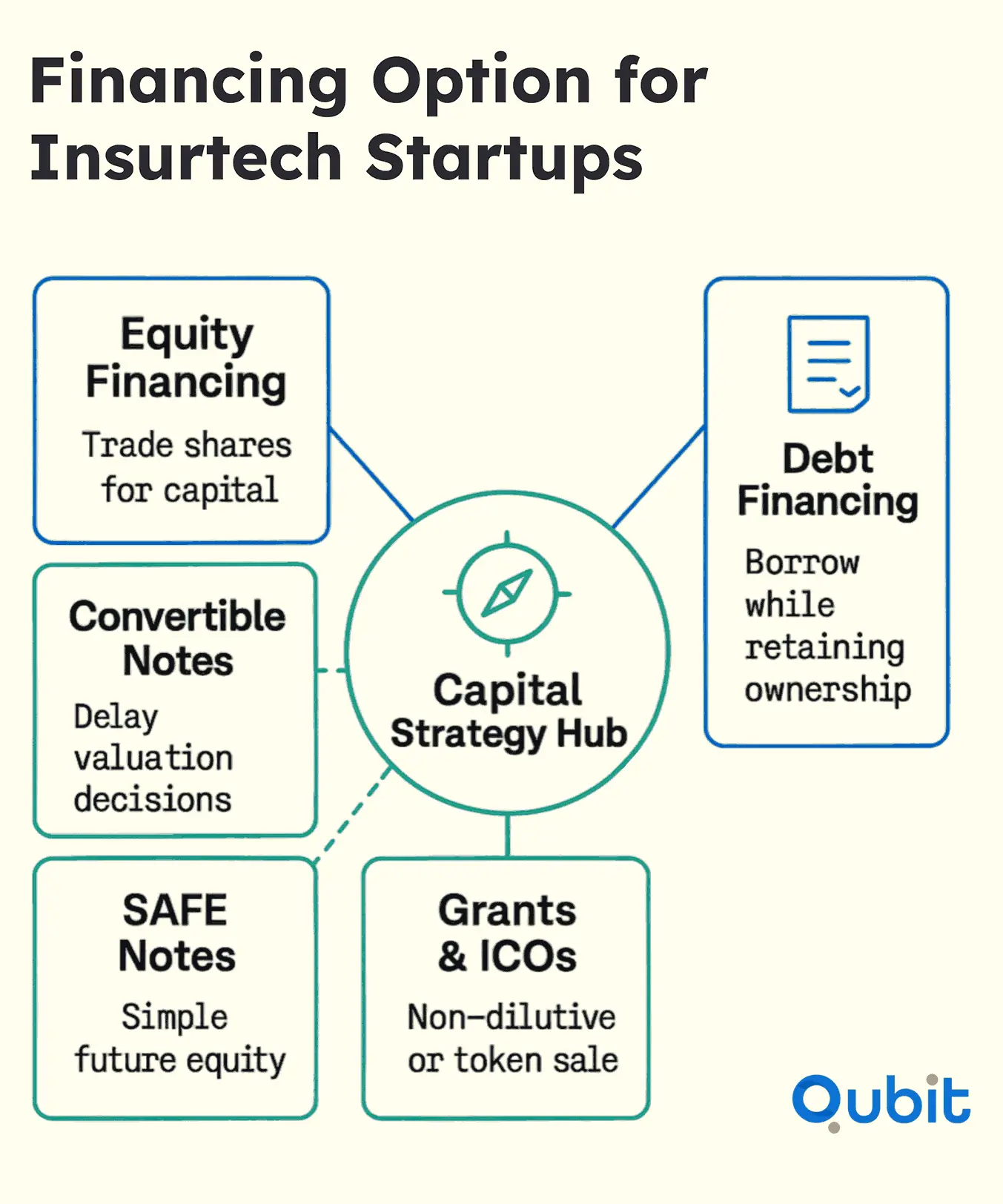Insurance-backed financing instruments are reshaping the way startups secure capital, offering innovative solutions tailored to the unique needs of the insurance sector. These instruments combine traditional funding mechanisms with the security of insurance guarantees, enabling startups to access capital while mitigating risks. For founders, understanding the regulatory approval process early on is crucial to ensuring compliance and smooth operations.
The examination of insurance-backed financing instruments finds alignment with the broader insights presented in insurance startup fundraising strategies, offering you a contextual perspective on startup funding dynamics. This article will explore how these instruments empower insurtech companies to scale rapidly, with actionable insights and real-world examples like Lemonade and Oscar Health.
Strategic Capital Management & Financial Projections for Insurtech
Effective financial planning and capital management are essential for insurance startups aiming to thrive in a competitive market. Building a robust financial foundation involves several critical steps, from pre-launch budgeting to securing long-term investor confidence.
Pre-Launch Budgeting and Capital Sources
Insurance startups must prioritize pre-launch budgeting to ensure operational readiness. This includes allocating funds for technology infrastructure, regulatory compliance, and marketing. Identifying capital sources early, whether through venture capital, angel investors, or strategic partnerships, can streamline funding timelines and reduce operational risks. For example, mapping your Competitive Environment is essential to shape your capital strategies and stand out in a crowded market.
Long-Term Financial Projections
Reliable financial projections are vital for demonstrating stability and growth potential. Utilizing industry-specific metrics such as loss ratio, expense ratio, and Risk-Based Capital (RBC) ensures that five-year projections resonate with investors and regulatory bodies. These metrics not only validate the startup’s financial health but also enhance its credibility in securing ratings from recognized organizations.
Investor Relations and Shareholder Agreements
Establishing strong investor relations is key to sustaining multi-round financing. Transparent shareholder agreements that outline equity distribution, voting rights, and exit strategies foster trust and collaboration. Additionally, considering trends like the Stabilization of Insurtech Funding can help startups plan multi-round financing effectively, ensuring a strong post-seed track record.
Securing Ratings and Building Credibility
Ratings from respected organizations play a pivotal role in attracting investors and customers. Aligning with emerging trends, such as the Rise of AI-Centric Deals, can boost startup valuations and investor interest. With 61.2% of Q1 2025 deals focusing on AI in underwriting, claims, and customer service, insurtech startups can position themselves as innovative leaders in the industry.

Equity Financing: Balancing Ownership & Growth in Insurtech
Straight equity financing offers insurtech startups a direct path to securing capital by exchanging shares for investment. This approach eliminates repayment obligations, ensuring that businesses can focus on growth without immediate cash flow concerns. For startups in fast-evolving industries like insurtech, this flexibility can be a game-changer, allowing them to allocate resources toward innovation and scaling.
However, issuing new shares comes with its own set of challenges. Founder ownership is diluted, which may lead to reduced decision-making power. While strategic investors often bring valuable expertise and networks, their involvement could introduce control complexities, especially if their interests diverge from the founders’ vision. Balancing these dynamics is critical to maintaining both operational autonomy and long-term growth potential.
For insurtech startups exploring alternative funding methods, an analysis of financing alternatives connects with the comparative insights in accounts receivable insurance vs factoring growth rounds, where you can observe distinct differences in funding methodologies for growth phases.
Debt Financing: Pros and Cons for Insurance Startups
Debt financing can be a powerful tool for insurance startups seeking immediate access to capital without sacrificing ownership. By borrowing funds, founders retain full control over their equity, ensuring their vision remains intact. Additionally, interest payments on debt may provide tax advantages, potentially reducing the overall cost of financing.
However, debt financing comes with its own set of challenges. Strict repayment schedules can strain cash flow, especially for startups still building their revenue streams. Collateral requirements further complicate matters, as they often demand valuable assets to secure loans. This can expose startups to liquidity risks, particularly if unforeseen circumstances impact their ability to meet obligations.
For a deeper understanding of how insurance-backed guarantees can help reduce borrowing costs and collateral burdens, explore insurance backed guarantees borrowing costs startups.
While debt financing offers undeniable benefits, insurance startups must weigh these against the potential risks to ensure sustainable growth.
Convertible Notes: Flexible Funding for Early-Stage Insurtech
Convertible notes offer a streamlined funding solution for startups aiming to prioritize growth over complex negotiations. These debt instruments convert into equity during future funding rounds, allowing early-stage companies to delay valuation discussions. This flexibility is particularly appealing to insurtech startups, where rapid innovation often takes precedence over lengthy financial deliberations.
By postponing valuation, convertible notes simplify the fundraising process, enabling founders to focus on scaling their operations. However, it’s essential to carefully define conversion terms to avoid potential dilution or disputes when the notes convert into equity. For insurtech startups, where market dynamics can shift quickly, this funding tool provides the agility needed to secure initial capital without locking in a premature valuation.
The simplicity of convertible notes makes them a popular choice for early-stage ventures, especially those navigating uncertain market conditions. While they offer significant advantages, startups should approach them with a clear understanding of their long-term implications.
SAFE Note Financing: Streamlined and Founder-Friendly
SAFE notes, or Simple Agreements for Future Equity, have revolutionized startup financing by offering a straightforward and founder-friendly mechanism for raising capital. Unlike traditional debt instruments, SAFE notes do not accrue interest or require repayment, making them an attractive option for early-stage ventures seeking flexibility.
One of the key advantages of SAFE notes is their ability to simplify legal and operational processes. This streamlined approach accelerates funding rounds, allowing founders to focus on building their businesses rather than navigating complex financing structures. Additionally, SAFE notes avoid immediate dilution, as equity conversion typically occurs during a future financing event.
However, while SAFE notes are designed to align with founders' needs, potential misalignments can arise between founders and investors regarding conversion events. These challenges often stem from differing expectations about valuation caps or triggering events, underscoring the importance of clear communication during negotiations.
For startups aiming to secure funding without the burdens of traditional debt, SAFE notes provide a practical and efficient solution. Their simplicity and founder-friendly terms make them a popular choice in the entrepreneurial ecosystem.
KISS Note Financing: Standardized Solutions for Seed Funding
KISS notes, introduced by 500 Startups, have revolutionized seed funding by offering a streamlined approach to early-stage investments. These standardized, capped convertible securities simplify negotiations, enabling founders and investors to focus on growth rather than legal complexities. With preset terms that are designed to be founder-friendly, KISS notes reduce the need for extensive legal overhead, saving both time and resources during the funding process.
While their simplicity is a significant advantage, KISS notes may not always accommodate unique investor requirements in more intricate funding scenarios. For startups seeking tailored agreements, the standardized nature of KISS notes could present limitations. However, for many seed-stage ventures, they remain an efficient and practical solution to secure initial capital.
Grants & Subsidies: Leveraging Non-Dilutive Funding for Insurtech
Grants and subsidies offer a unique financial pathway for insurtech startups seeking growth without sacrificing equity. These non-dilutive funding options provide access to capital that does not require repayment, allowing founders to retain full ownership while driving innovation. For insurtech companies, this can be particularly advantageous in developing cutting-edge technologies or expanding market reach.
However, accessing these funds often comes with challenges. Strict eligibility criteria can limit the pool of applicants, requiring businesses to meet specific industry, geographic, or innovation benchmarks. Additionally, grants and subsidies frequently involve milestone-based deliverables, meaning funds are disbursed incrementally as predefined goals are achieved. This structure can extend timelines and demand meticulous planning to ensure compliance.
For insurtech startups, understanding the nuances of grant applications and subsidy programs is essential. While these funding sources preserve equity, they require significant effort in preparation and execution. By aligning their projects with the objectives of funding bodies, startups can unlock opportunities to fuel their growth without diluting ownership.
ICOs & Token Sales: Digital Asset Funding for Insurtech
Initial Coin Offerings (ICOs) and token sales are reshaping how insurtech startups secure funding. These digital financing methods provide founders with access to a global pool of investors, enabling rapid capital acquisition without immediate equity dilution. Unlike traditional fundraising, ICOs allow startups to issue tokens that represent a stake in their project or utility within their ecosystem, attracting interest from tech-savvy investors worldwide.
However, this innovative approach comes with challenges. Regulatory uncertainties surrounding ICOs can deter institutional investors, as compliance requirements vary significantly across jurisdictions. Additionally, the volatile nature of cryptocurrency markets introduces risks that may impact token valuation and investor confidence. For insurtech startups, balancing the benefits of global reach with the complexities of digital asset financing is crucial.
Despite these hurdles, ICOs and token sales remain a compelling option for insurtech ventures aiming to scale quickly. By leveraging blockchain technology, these funding methods offer transparency and efficiency, appealing to a new generation of investors. As the regulatory landscape evolves, insurtech startups must stay informed and adaptable to maximize the potential of digital asset funding.
Ready to Raise Capital? Taking Action for Your Insurtech Venture
Turning plans into action is the defining step for any insurtech founder ready to raise capital. Combining diverse financing instruments, such as equity, debt, or convertible notes, can reduce exposure to risk while accelerating growth. This strategic approach ensures that your venture remains adaptable to market dynamics while securing the resources needed for expansion.
Streamlining the process of connecting with investors is equally critical. Direct pitch submissions offer a straightforward path to accessing founder-friendly funding networks. For insurtech entrepreneurs, this means less time navigating complex systems and more time focusing on innovation.
Conclusion
Securing funding for an insurance startup requires a strategic approach tailored to the unique challenges of the industry. Throughout this blog, we’ve explored diverse insurance startup financing options, emphasizing the importance of aligning financial strategies with your business goals. From traditional loans to venture capital, each method offers distinct advantages depending on your startup’s stage and vision.
If you're seeking tailored support in securing funding, we at Qubit Capital offer our Fundraising Assistance services to help you navigate the complex world of insurance startup financing. Let’s get started!
Key Takeaways
- A wide range of financing instruments is available to tailor funding solutions for insurance startups.
- Strategic financial planning and clear capital projections build investor confidence.
- Alternative funding methods like SAFE, KISS notes, ICOs, and grants offer unique benefits without diluting ownership.
- Real-world case studies, such as those of Lemonade and Oscar Health, validate the effectiveness of these instruments.
Frequently asked Questions
What are the best financing options for insurance startups?
Insurance startups can explore various financing options tailored to their needs. Straight equity offers ownership stakes, while debt financing provides capital without diluting equity. Convertible notes and SAFE/KISS notes are hybrid instruments combining debt and equity features. Grants and subsidies offer non-dilutive funding, and ICOs (Initial Coin Offerings) provide innovative capital access through token sales. Each option has unique benefits and considerations, making it essential to align choices with business goals.


 Back
Back



